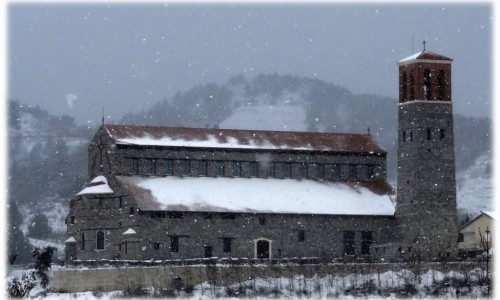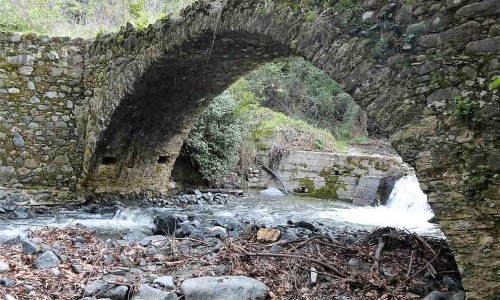Gefiri Treis Elies (Treis Elies Venetian Bridge)
Tucked deep in the Troodos Mountains, near the sleepy village of Treis Elies, lies a bridge that seems to span not only a mountain stream—but time itself. The Treis Elies Bridge, though lesser-known than some of its famous medieval cousins, is a beautiful example of Cyprus's stone-arched rural architecture, and a quiet testament to the island’s rich past.
Visiting this modest bridge feels like stepping into a forgotten chapter of Cypriot history—one where donkeys carried baskets of grapes and villagers crossed forested paths to reach markets, mills, and monasteries. It is a place of natural serenity, gentle history, and slow discovery.
Where is Treis Elies? A Village of Whispering Trees
The name Treis Elies means "Three Olive Trees" in Greek. This tranquil mountain village lies in the Limassol District, nestled between towering pines, oaks, and plane trees. With fewer than 50 permanent residents, the village is a world away from coastal resorts and busy tourist towns.
Treis Elies is known for:
- Its lush green surroundings even in summer
- Traditional stone houses and narrow paths
- Friendly, elderly locals who offer coffee and stories in equal measure
- A dedication to preserving rural traditions and crafts
From the village, a short walk or drive leads to the stone bridge, hidden among the trees and the gentle murmur of a flowing stream.
A Modest Marvel: The Bridge Itself
The Treis Elies Bridge is a single-arched stone bridge built over the Kryos River, a tributary of the Diarizos. While its exact construction date is unclear, it likely dates back several centuries—perhaps to the Venetian period (15th–16th century), when a network of such bridges supported travel and trade through the mountains.
Though not as tall or wide as other historic bridges like Kelefos or Tzelefos, Treis Elies Bridge has its own delicate charm:
- Its low arch curves gently over the stream, blending perfectly with the natural surroundings.
- Constructed from local stone, the bridge almost disappears into the forest, as though it grew there.
- Moss, ferns, and ivy often creep along its edges, adding to its fairytale quality.
It’s a small bridge, yes—but it feels timeless. You can stand on it and imagine travelers from centuries past making their way through the forest with olive oil, cheese, or wine headed for neighboring villages.
Nature, Silence, and the Sounds of Water
One of the most striking aspects of visiting Treis Elies Bridge is the peacefulness of the location. Unlike more popular sites, you’re unlikely to find tour groups or commercial noise here. Instead:
- You’ll hear the splash of water over stones, even in dry months.
- Birds flutter through the canopy above.
- The occasional butterfly or dragonfly drifts by in the filtered sunlight.
The setting is perfect for nature lovers, photographers, or those seeking a moment of meditative calm. The nearby riverbanks invite a picnic, a sketchbook, or simply time spent doing nothing at all.
A Forgotten Network of Mountain Trails
In centuries past, Treis Elies Bridge was part of a larger network of paths connecting villages and trading points in the Troodos region. These trails were used for:
- Agricultural trade: Farmers moving between fields, markets, and presses
- Religious pilgrimage: Monks and villagers visiting remote chapels and monasteries
- Community ties: Weddings, funerals, and festivals that linked small communities
Today, some of these trails are being rediscovered and marked as eco-tourism walking routes, ideal for hikers looking to connect with both nature and history.
Cultural Revival and Local Stories
Though small, Treis Elies village has embraced a kind of quiet cultural revival in recent years. With support from local initiatives and cultural groups, efforts have been made to preserve the bridge and surrounding trails, as well as to record oral histories from the older residents.
You may still find someone in the village who remembers crossing the bridge on foot or donkey, or can tell you about childhood adventures in the forest nearby.
The area has also inspired local poetry and photography, and some small exhibitions have been organized in recent years to highlight the beauty of the bridge and the rhythms of mountain life.
How to Visit
- Location: Treis Elies village, Limassol District. Access via mountain roads from Agios Nikolaos or Kaminaria.
- Getting There: The bridge is reachable by foot from the center of the village—about a 15-minute walk through orchards and paths.
- Tip: Wear proper walking shoes. Paths may be uneven, and the terrain can be slippery in wet months.
- Bring: Water, a light snack or picnic, and a camera—you'll want to linger.
Combine With Nearby Sites
If you're exploring the region, you can also visit:
- Kaminaria: A similarly quaint village nearby with stone architecture and a sleepy charm.
- Tzelefos Bridge: The largest medieval bridge in Cyprus, deep in the forest.
- Agios Nikolaos tis Stegis: A UNESCO-listed painted church about 40 minutes away.
- Local wineries in nearby Troodos villages offering tastings and homemade zivania.
The Treis Elies Bridge may not make it onto every Cyprus itinerary—but perhaps that’s part of its magic. It is a bridge not just between two banks, but between centuries, a simple structure that connects modern visitors with a slower, more harmonious way of life.
In a world rushing toward the future, it offers a moment of stillness. And if you stand quietly long enough, you might just hear the echo of hooves, the rustle of leaves, and the timeless whisper of the river below.


















